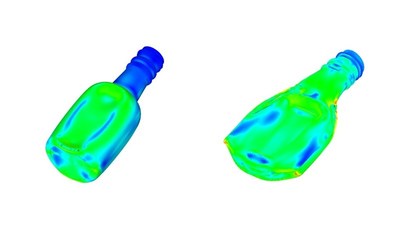Fate of billions of plastic bottles potentially altered through ground-breaking Amcor technology
Amcor Rigid Packaging (ARP) announced a breakthrough technology aimed at improving the recyclability of small PET bottles, particularly 50 ml spirits bottles, which are often overlooked in recycling processes. This innovation allows the bottles to collapse in a controlled manner, maximizing their width to prevent them from slipping through sorting screens at U.S. recycling facilities. With a goal to make all packaging recyclable by 2025, ARP is committed to enhancing sustainability efforts. This design aims to increase recyclability rates and reduce material waste in the recycling system.
- Innovative technology maximizes recyclability of small PET bottles.
- Design prevents bottles from slipping through sorting screens, enhancing recycling efficiency.
- ARP aims to develop all its packaging to be recyclable, compostable, or reusable by 2025.
- None.
Insights
Analyzing...
ANN ARBOR, Mich., Nov. 15, 2021 /PRNewswire/ -- In conjunction with America Recycles Day, Amcor Rigid Packaging (ARP) is announcing a technological advancement that makes it possible for billions1 of small bottles to be recycled. ARP, known for its designed-to-be-recycled packaging, is always looking for ways to increase the amount of material that makes it to – and through – the recycling process.
ARP is first applying the technology to 50 ml spirits bottles. These bottles, while made of recyclable polyethylene terephthalate (PET), are often lost in the recycling process due to their small size. Most people recognize these as the little liquor bottles often served on airplanes. Despite its material being infinitely recyclable2, the size of these bottles presents challenges at most U.S. material recycling facilities (MRFs). The bottles tend to slip out of the sorting process where broken glass is filtered out for disposal.
"We know that many small bottles are falling through screens in our MRFs designed to separate glass, so this is a major development – it allows these bottles to pass this step in the process and have the opportunity to be captured by the appropriate equipment downstream. At a time when the recycling industry is constrained by material supply every additional pound diverted from waste makes a big difference," said Curt Cozart of the Association of Plastic Recyclers.
With its pledge to develop all its packaging to be recyclable, compostable or reusable by 2025, Amcor is always innovating to increase the recyclability of its products. Seeing an opportunity for improvement, ARP's team of engineers examined the issue and began designing a container that collapses in a controlled way to maximize its width. With a collapsed width greater than 5 cm, this design would no longer slip through the cracks at most U.S. recycling facilities.
"This discovery was made by the Amcor team when testing revealed that the bottles collapse in different ways," said Terry Patcheak, VP of Research & Development and Advanced Engineering at ARP. "Our simulations demonstrated that when these tiny spirits bottles are designed to collapse in a specific way, fewer bottles actually fall through the cracks. The potential here is higher recyclability rates and more recycled content for multiple segments and materials."
Amcor's bottle design includes intentional failure points and is based on the Association of Plastic Recyclers specific guidelines. Finite Element Analysis testing is being undertaken to better understand the dynamics of these small bottles during the recycling process. Additionally, ARP will partner with recycling facilities to capture real-world data about the recyclability of its new bottle.
"We look forward to seeing the data and continuing to use this kind of creative approach to look at all of our packaging. In partnering with the APR, we are looking at size, color and material to increase the amount of recycled material that can be turned into more bottles. We look forward to partnering with our customers as we use a new lens to look at ways to meet our shared sustainability goals," Patcheak said.
1 Based on industry data |
2 With existing technologies like chemical recycling |
Find out more:
Learn more about PET bottles: https://www.amcor.com/choosepetbottles
Read the 2020 Amcor Sustainability Report: https://www.amcor.com/sustainability-report
About Amcor
Amcor is a global leader in developing and producing responsible packaging for food, beverage, pharmaceutical, medical, home and personal-care, and other products. Amcor works with leading companies around the world to protect their products and the people who rely on them, differentiate brands, and improve supply chains through a range of flexible and rigid packaging, specialty cartons, closures, and services. The company is focused on making packaging that is increasingly light-weighted, recyclable and reusable, and made using an increasing amount of recycled content. Around 46,000 Amcor people generate
www.amcor.com I LinkedIn I Facebook I Twitter I YouTube
![]() View original content to download multimedia:https://www.prnewswire.com/news-releases/fate-of-billions-of-plastic-bottles-potentially-altered-through-ground-breaking-amcor-technology-301424534.html
View original content to download multimedia:https://www.prnewswire.com/news-releases/fate-of-billions-of-plastic-bottles-potentially-altered-through-ground-breaking-amcor-technology-301424534.html
SOURCE Amcor Rigid Packaging









